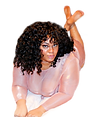- Moody Gem

- Jan 6, 2021
- 3 min read
On Nov 13th I posted a series of posts to my instagram stories:
I was being a bit melodramatic, but I felt I was not making the right choices. I was sucking at asserting my boundaries. I kept running in toxic circles around thoughts of my past including dead and gone relationships. Most importantly because I wasn't sure of myself, I was really unsure of EVERYone around me. I decided to take a break from social media to try to get a grip on my irrational fears. Some of them being: my friends and family only tolerate me, I am not worthy of love, and I will never ever truly be able to love or trust anyone. These were some heavy hitters. I wasn't suicidal yet, but I could feel it looming.
I continued taking my medication and expressed my lack of trust of myself and others in therapy. I was encouraged to act on my truth, and in that time it meant taking some distance from circumstances that "no longer served me." I was talking a good game. I was finding the courage to walk away. I was scared sh*tless that I was always going to be repeating this pattern of pulling away from my loved ones only to return with apologies and just a little less trust. See, no one loved me.

By the third week, friends started reaching out to see if I was okay. I was determined to not respond in a way that would alarm them. I felt like perhaps this all just looked like I was acting out. Was I in fact just acting out? I didn't respond to texts and ignored dms.
By the sixth week, I had started to return to social media. I archived my entire instagram, and decided to try and redesign. I was taking care of myself by walking when I felt up to it and going vegan. I was determined not to gain weight during my time alone. I pretended I didn't miss anyone, but in reality, I was lonely. I was trying my best to create new habits and patterns to deal with disappointment. I had convinced myself since I was so scared of losing everyone I loved because they'd grow tired of me that I needed to give everyone a much needed break. During this break, I was determined to figure out what was wrong with me, so I could come back worthy and ready for less toxic relationships. It was not working.
I finally reached out to my best friend when I realized she too had decided to go plant-based, and ironically we'd both purchased the same shoes off of Amazon without knowing. I decided to talk to her and be honest about my decision to isolate. To my surprise she was genuinely concerned and not angry at me. I reached out to my other friends within that following week.
I found a thread on instagram talking about what I felt like I was going through:
This post was insightful. I had always blamed depression for the cycle of ghosting that I tend to do when I am not in my best frame of mind, but many of the reasons why I did it were laid out in front of me as anxiety symptoms. I decided to try and give myself a little grace.
I made some good choices during my time of isolation, but I honestly don't feel that what I did and the way I did it was necessary. I am not a burden, though my depression keeps telling me I am. I hope to not isolate in such an extreme way again, but only time will tell. If you didn't get it by now, there's no un-successful way to get out of a damn depression pit.















